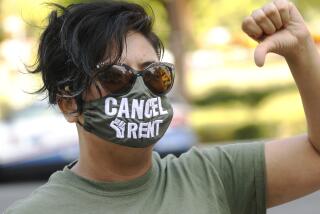Pasadena’s Ammunition Law Headed for Repeal
- Share via
Two years after leaping to the forefront in gun control by requiring people who buy ammunition to register with police, the Pasadena City Council voted tentatively Monday night to repeal the law, saying it was well-intended but useless.
The decision, by 4-2 vote, delays a final vote for at least 30 days--a period council members said will give supporters of the measure an opportunity to strengthen its language and make it an effective law enforcement tool. Councilmen Paul Little and Sidney Tyler opposed the measure and Councilman William Crowfoot was absent.
“We have an ordinance that is not producing tangible results,” Councilwoman Ann-Marie Villicana said.
The vote came just six months after the council rejected a proposed ban on the sale of Saturday night specials, leaving some local activists worried that Pasadena is backing down from its role as a municipal laboratory of progressive policies.
Meanwhile, Los Angeles is poised to strengthen its own ammunition registration ordinance by requiring purchasers of ammunition not only to leave their name and address with gun store owners when they buy bullets, but also to leave a thumbprint. In contrast to Pasadena police, whose files on registered ammunition buyers are maintained by a volunteer, the Los Angeles Police Department has a squad of investigators who check the backgrounds of everyone who buys ammunition in Los Angeles.
Those checks have not led to any prosecutions, but authorities say that’s because criminals are aware of the law and no longer buy bullets in Los Angeles.
“This is what the city fathers want, to show that we mean business,” said LAPD Det. Steve Mulldorfer, head of the gun detail. “Los Angeles has a very strong policy statement on guns.”
Los Angeles City Councilman Mike Feuer, who plans to introduce a motion to toughen Los Angeles’ registration ordinance in the next 10 days, attended Monday’s Pasadena council meeting and urged the council to delay a vote.
“There are ways this ordinance can be toughened,” Feuer said. “[Los Angeles] is looking at thumbprinting. . . . Los Angeles police officers feel [a thumbprint] could help them trace ammunition involved in crime.” He said thumbprinting will better enable authorities to prosecute in cases in which parolees who are prohibited from possessing guns buy bullets.
The Pasadena law was passed in 1995 in the wake of a series of homicides in the city, including the 1993 Halloween night slaying of three boys by gang members. At the time, the ordinance was lauded by activists as a bold new step in local gun control, the first of its kind in the nation.
The law called for all buyers of ammunition to present identification and register at gun shops, which would then make the data available to police. Two of Pasadena’s three gun stores closed in the first year the law was in effect. Even though overall crime rates were decreasing, gun slayings actually rose in the city, from nine in 1995 to 11 in 1996.
Police said the registration information was useless in solving these, or any other crimes, largely because most ammunition used by crooks is purchased illegally. They also said that the simple fact that a shooting suspect purchased bullets would not be enough for a conviction.
“It hasn’t been beneficial whatsoever,” said Pasadena Police Lt. Rick Law, adding that it would be inefficient to do checks on bullet buyers. “Our position is we don’t need it.”
“It just doesn’t seem valuable,” said Councilwoman Joyce Streator in a hearing last month. “I have seen no indication that gangs go to local gun stores.”
*
Gun control opponents pointed out that ammunition registration was a federal law until the late 1980s, when it was repealed by Congress. Opponents say that was because it was not an effective law enforcement tool.
“They finally have come to realize that much like a perpetual motion machine [ammunition registration] is a great idea but won’t work,” said Joel Friedman, chairman of the National Rifle Assn.’s Pasadena chapter, in an interview before the meeting.
After the meeting, Friedman said he was disappointed that the council offered opponents more time to bolster their arguments. “I feel the council understands the ordinance won’t work but won’t go against an influential faction in this town.”
But gun control advocates who have worked frantically to maintain the measure were optimistic.
“We didn’t have the votes tonight, but we are hopeful we can come back with a strengthened ordinance,” said the Rev. George Regas, president of the Coalition for a Nonviolent City. “I think it’s a hard battle, but this is a victory we will eventually win.”
More to Read
Sign up for Essential California
The most important California stories and recommendations in your inbox every morning.
You may occasionally receive promotional content from the Los Angeles Times.










